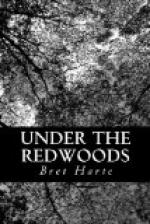Daddy silently grasped the “infant’s” hand, who presently secured the photograph without attracting attention from the card-players. It was promptly inclosed in the letter, addressed to Master James Lasham. The “infant” started with it to the post-office, and Daddy Folsom returned to Lasham’s cabin to relieve the watcher that had been detached from Falloner’s to take his place beside the sick man.
Meanwhile the rain fell steadily and the shadows crept higher and higher up the mountain. Towards midnight the star points faded out one by one over Sawyer’s Ledge even as they had come, with the difference that the illumination of Falloner’s cabin was extinguished first, while the dim light of Lasham’s increased in number. Later, two stars seemed to shoot from the centre of the ledge, trailing along the descent, until they were lost in the obscurity of the slope—the lights of the stage-coach to Sacramento carrying the mail and Robert Falloner. They met and passed two fainter lights toiling up the road—the buggy lights of the doctor, hastily summoned from Carterville to the bedside of the dying Dick Lasham.
The slowing up of his train caused Bob Falloner to start from a half doze in a Western Pullman car. As he glanced from his window he could see that the blinding snowstorm which had followed him for the past six hours had at last hopelessly blocked the line. There was no prospect beyond the interminable snowy level, the whirling flakes, and the monotonous palisades of leafless trees seen through it to the distant banks of the Missouri. It was a prospect that the mountain-bred Falloner was beginning to loathe, and although it was scarcely six weeks since he left California, he was already looking back regretfully to the deep slopes and the free song of the serried ranks of pines.
The intense cold had chilled his temperate blood, even as the rigors and conventions of Eastern life had checked his sincerity and spontaneous flow of animal spirits begotten in the frank intercourse and brotherhood of camps. He had just fled from the artificialities of the great Atlantic cities to seek out some Western farming lands in which he might put his capital and energies. The unlooked-for interruption of his progress by a long-forgotten climate only deepened his discontent. And now—that train was actually backing! It appeared they must return to the last station to wait for a snow-plough to clear the line. It was, explained the conductor, barely a mile from Shepherdstown, where there was a good hotel and a chance of breaking the journey for the night.
Shepherdstown! The name touched some dim chord in Bob Falloner’s memory and conscience—yet one that was vague. Then he suddenly remembered that before leaving New York he had received a letter from Houston informing him of Lasham’s death, reminding him of his previous bounty, and begging him—if he went West—to break the news to the Lasham family. There was also some allusion to a joke about his (Bob’s) photograph, which he had dismissed as unimportant, and even now could not remember clearly. For a few moments his conscience pricked him that he should have forgotten it all, but now he could make amends by this providential delay. It was not a task to his liking; in any other circumstances he would have written, but he would not shirk it now.




